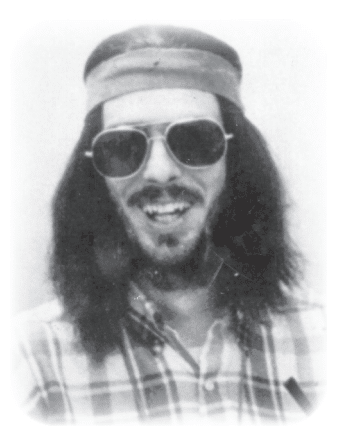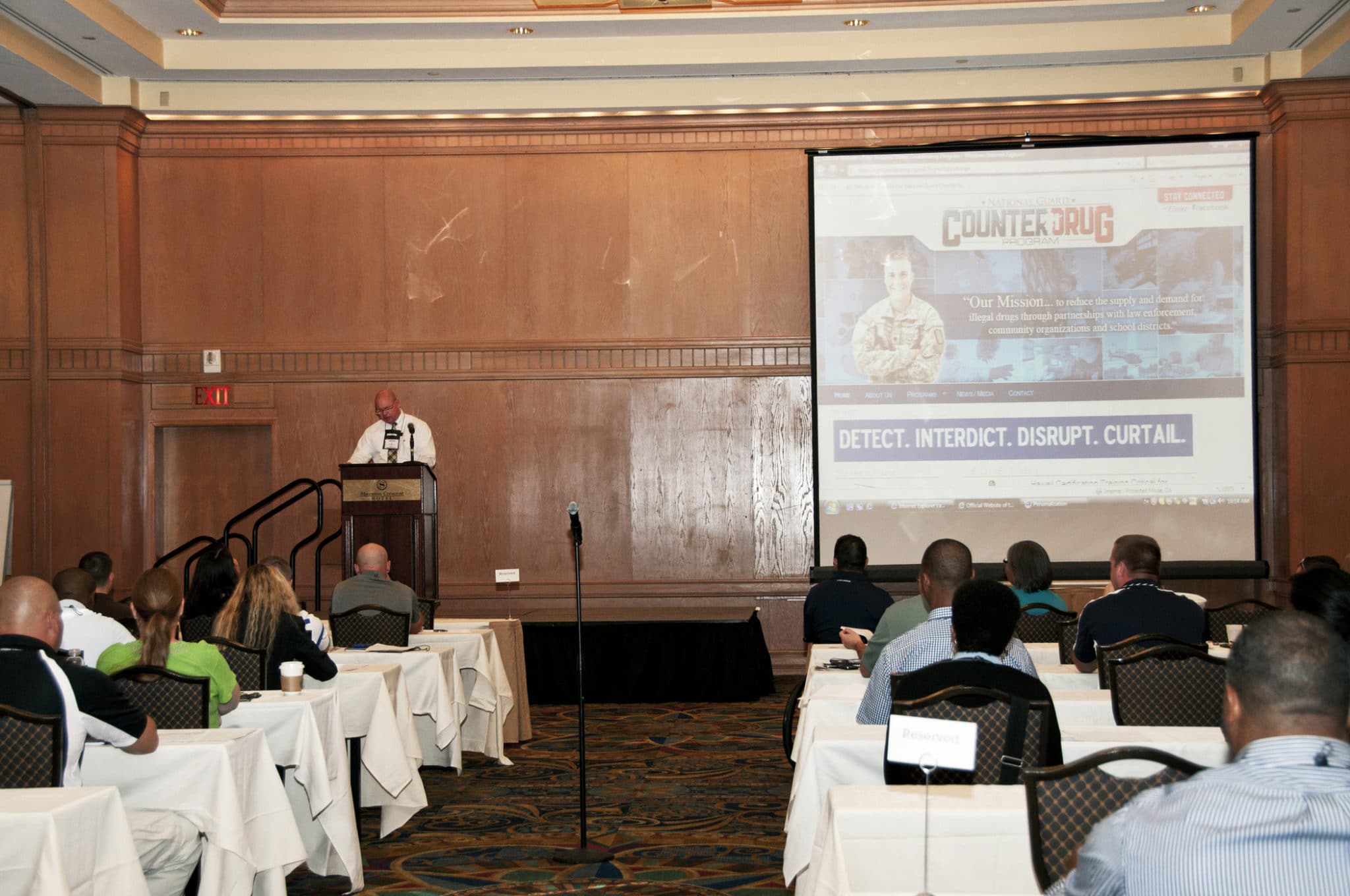A federally funded training program for law enforcement and other students offers a course titled Science-Based Drug Education (SBDE). Leaked records indicate that when one former law enforcement officer was at its helm as the instructor, it was anything but that.
Survey responses for the Midwest Counterdrug Training Program’s (MCTP) class—revealed through BlueLeaks, a data dump of law enforcement intelligence obtained by hackers—report that instructor Ed Moses pushed stigmatizing attitudes towards, personal bias against, and factually incorrect information about people who use drugs.
Moses is a retired undercover drug officer with the Missouri State Highway Patrol who now works as a consultant for MCTP, despite no formal scientific background. He was also on the board of directors of Drug Watch International—a seemingly defunct volunteer organization that advocated for, according to its principles, the prohibition of and abstinence from all drugs (including alcohol and tobacco) and the maintenance of “strong laws and meaningful legal penalties that hold users and dealers accountable for their actions.” The organization was firmly opposed to harm reduction efforts—which it described as “policies and programs that accept drug use based erroneously on reduction or minimization of harm.”
Moses and MCTP did not respond to Filter‘s request for comment.
 Photograph of Ed Moses as an undercover narcotics officer in 1970s, via Missouri State Highway Patrol
Photograph of Ed Moses as an undercover narcotics officer in 1970s, via Missouri State Highway Patrol
Teaching the SBDE course, Moses “repeatedly” described people who use cannabis as “the stupid dopers,” “the stupid stoners” and “dumb pot smokers,” in a “very derogatory tone of voice (too judgmental),” reported one of the law enforcement students in attendance at a three-day session in August 2015. A classmate said the instructor referred to “people who use or are trying to legalize marijuana” as “dopers” and “parasites.”
The presentation of bigoted opinions, not fact-based information, stuck out for Moses’ students.
One student at that training pushed back in their survey response against Moses’ stigmatizing language. “[P]eople that use drugs are not stupid. Even though we may think that some of the things that they do are stupid there are better less judgmental ways to talk about them and their choices.”
“Instead of saying ‘pothead’ I would call someone a heavy or habitual marijuana user,” they continued. “Remember that if we were in their shoes we would probably do the exact same things. So it is useless to try to categorize them by what KIND of person they are.”
A later student, though, shared Moses’ stigmatizing lexicon in a May 2019 survey response, using the term “doper” for a person who uses drugs.
The presentation of bigoted opinions, not fact-based information, stuck out for Moses’ students.
“The Instructors personal bias on tobacco and alcohol use were readily apparent,” wrote a person who attended a three-day July 2016 SBDE course, and who even described themselves as “not one to quote the need for/nor the poster child for political correctness.”
Yet, for them, “this instructor was disdainful.” Moses reportedly warned the class about “the perils of smoking and other tobacco use and his distaste for its use,” and “the evils of Marijuana and other THC.”
His bigotry was reportedly not limited to people who use drugs. Apparently, he brought up “topics such as Ferguson, ‘homosexuals,’ Obama,” which a surveyed student from the August 2015 class described as being “out of context.” Moses made racist remarks about the “excessive alcohol consumption” stereotype of “the American Indian population as well as Eskimos,” according to the July 2016 attendee.
Unsurprisingly, Moses’ source material was reportedly far from being peer-reviewed research. “Many slides” according to a student, “were screen captures from Fox News.”
Moses seemed to be hostile to fact-based information. After attending the SBDE course in July 2017, one student who identified themself as a medical epidemiologist shared with the instructor “at least 2 dozen peer review research articles and fact sheets on gateway theory and benefits to needle exchange programs.”
Moses’ response? “I don’t care what the ACLU says,” he told the class the next day, according to the student. This reference to the progressive civil rights organization indicated to the medical epidemiologist that Moses had not even read the shared materials, since they cited mostly federal public health agencies. Moses’ response “created the impression that he was really not open to latest evidence based research or perspective that did not align with his beliefs.”
Moses reportedly also shared common, baseless anti-harm reduction talking points.
Even when Moses presented information based on research, it sometimes consisted of disproven theories about drug use. “If a class is called a ‘Science based’ education I would expect the Instructor to be open to current evidence based practices,” wrote the same student. “From start to finish Lt. Ed Moses (retired) pushed the ‘gateway theory’ a debunked theory that is not based in latest research.”
Moses has spoken to news media about his views on the debunked theory, saying: “name a drug that is not a gateway drug.” The MCTC course catalogue lists Gateway Theory as one of the topics covered.
Moses reportedly also shared common, baseless anti-harm reduction talking points. “When [Moses] talked about needle exchange programs he said these programs only extend the problem of IVDU [intravenous drug use],” the medical epidemiologist wrote. The claim that harm reduction programs increase drug use has been dismissed by the Center for Disease Control and Prevention, citing just a few studies from the vast scientific literature on their efficacy. “He criticized these programs calling them ‘needle give-a-way programs.’”
Concerningly, some students appeared to buy into the myths. “The earlier teens use any substance the greater the risk of addiction,” wrote one, describing this as part of the Gateway Theory. The naive acceptance by another student, who seemed to describe themself as being involved in substance use prevention, could have real world consequences: “This fact is something we can use as our focus as we have lots of young teens that use.”
MCTC’s Science-Based Drug Education course has even been lent credence by the Iowa Board of Certification (IBC), a nonprofit that certifies professional standards for addiction professionals. IBC has accredited the course, according to MCTC’s website, but the statement seems to have been deleted after Filter contacted MCTC.
The July 2016 course, during which Moses stigmatized tobacco and cannabis use and made racist comments about indigenous people, was approved for credit hours by IBC. The certifying organization only reviews a brief description of a training’s goals and objectives and a timed agenda, Executive Director Debbie Gilbert explained to Filter.
Gilbert “was shocked to hear about” the students’ reports, she said, adding that “I have held my job for 18 years and never heard a negative thing about the training.”
A National Guard instructor (not Moses) leading a counterdrug training in 2012, by Betty J. Squatrito-Martin via National Guard Bureau/Flickr/CreativeCommons





Show Comments